It’s nine in the morning on a Sunday and I find myself at a rave in an immense warehouse, located in Denmark in the area of Vesterbro, Copenhagen, just right outside of the city, celebrating four years of Fast Forward – the agency and event production company that has lit the match for the development of a DIY and energetic techno scene in the Danish capital.
The former tram depot is bathed in green and grey colours and its massive windows, doors and army decorations give the warehouse an eerie vibe. Hard, melodious, emotive, uncompromising and fast 140 BPM Danish techno blasts down its four Funktion-One sound system installations and cyan strobe lights invade the dark parts of the space – in a way, it could be to me what feels like the Berghain of Scandinavia. DJs Sugar, Anetha, DJ Tool and D.Dan have already raised the bar for each other and the rising BPMs encapsulate the energy of the crowd.
Suddenly I gasp as I look up to my best friend Paul, ‘That’s your track!’ he shouts. Ida Engelhardt is playing DJ IBON’s track ‘No Sleep,’ the masterpiece that brought me to Copenhagen in the first place and as I dance to the fast sound, I’m not sure if it’s sweat or tears of joy rushing down my face.
It had been two months ago since I discovered ‘No Sleep’ and I had never expected a track would bring me to the Scandinavian city in the first place. Biking through Amsterdam on a warm end-of-summer evening, I stumbled upon IBON’s track. From the first moment, it captivated me. The track resembled to me what feels like a three-chapter story. ‘No Sleep’ starts off with a sound insinuating a fire alarm going off. It reflects a feeling of something going wrong in life. This is followed by two oscillating heavenly melodies, which reflect a feeling of listening to your body, opening up and going through something. The third part is very positive and feels like a burst of positive and colourful emotions, which feels like healing and becoming stronger.
Touched by the track, I wanted to find out more about the artist. It became apparent that this was the sound coming from Copenhagen. Most of the tracks that I listened to – coming from the city – all possessed hints of negative and positive emotions. A combination I hadn’t heard in techno before. I dove deep into the scene, the stories, the artists and especially; the music and what it made me feel. I wanted to know all about the initiatives shaping the techno scene of Copenhagen and decided to go on another visit to the city at the end of October.
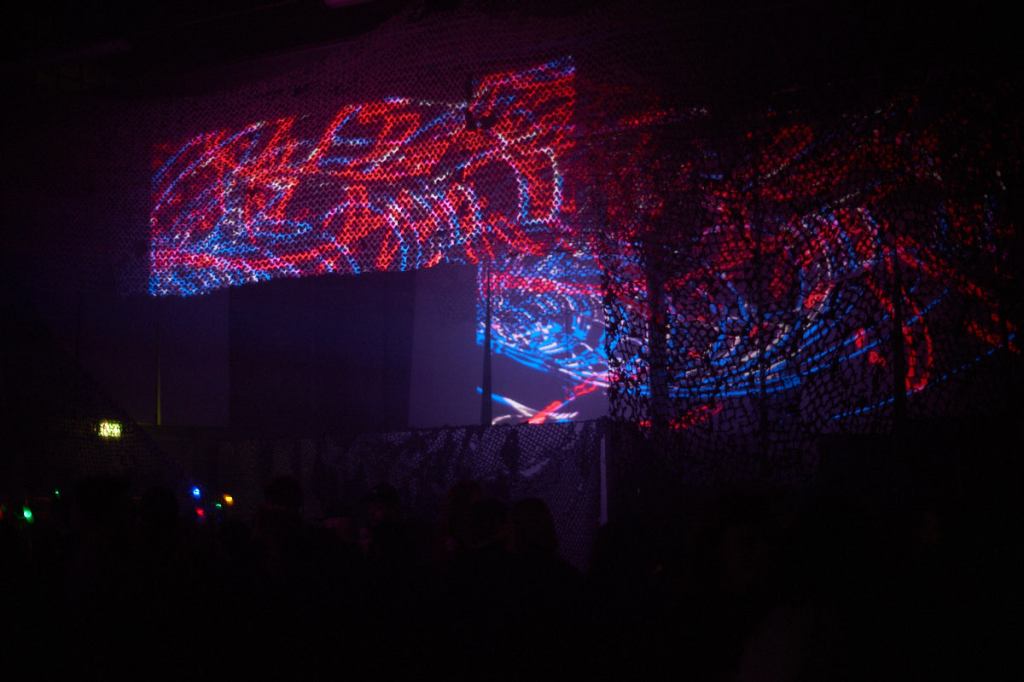
Photo: Fast Forward by Morten Bentzon
Now – two months later, I’m standing in a warehouse together with Paul. We’re two tall appearances, dancing wild and it’s obvious we’re outsiders, but we’ve never felt more like a part of something. People come to us to tell us our energy is insane, and we keep telling them how amazing their vibe is. I look around me and all I’m thinking is how interesting everyone looks. Most people are wearing vintage sport clothes, there’s an abundance in people wearing caps and chain necklaces. Without a doubt there’s a specific hint of Scandinavian fashion in their rave looks.
I see Alexander (DJ Repro), I see Freja and Bjarke (rave promotors from production company Bedside productions), Anders (agency runner), Nikolaj (DJ Sugar and co-founder) and the crew from Fast Forward. It feels like the perfect ending to an adventure, closing it with the people that I had talked with throughout the weekend, dancing to the track that brought me here in the first place.
Paul nods to me, ‘We have to catch our plane.’ Before we leave the warehouse, we are hugged and say our goodbyes to the people we’ve spoken with and met throughout the weekend. As we sit in the metro towards the airport – we’re in awe by what we just experienced. The friendliness, the feeling of community and the electric vibe we felt, is one that we will take home with us.
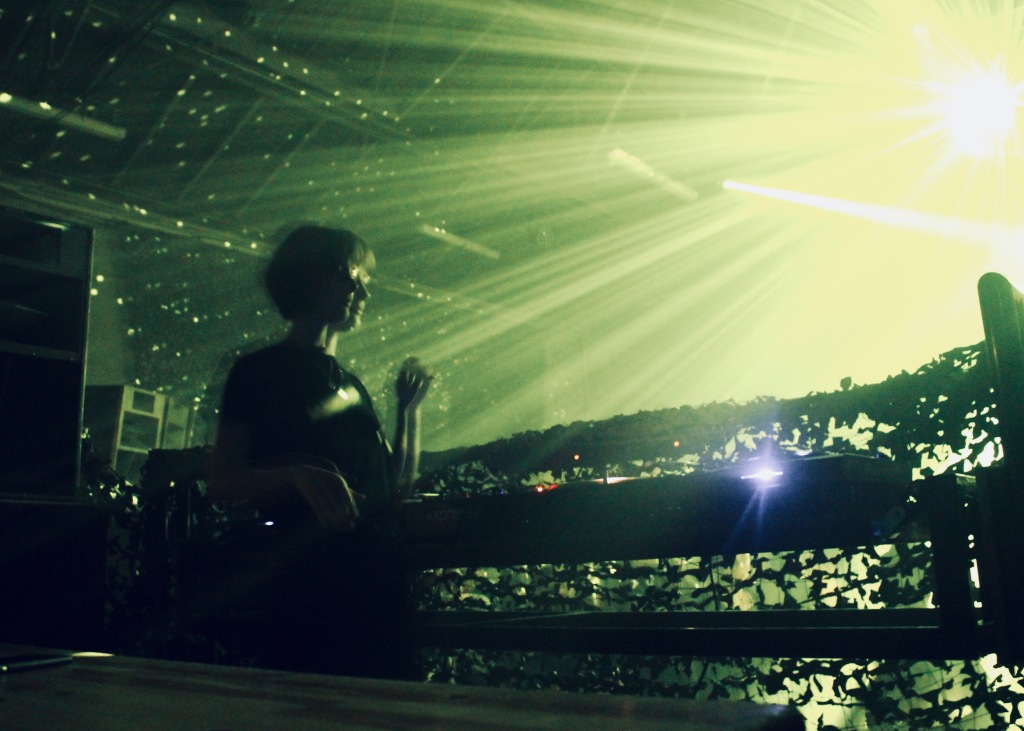
Photo: Courtesy playing Fast Forward by Morten Bentzon
It may then come as a surprise that just four years ago, the techno scene in Copenhagen wasn’t as exciting and flourishing as we know it now. That’s until agency and event production company Fast Forward came around. The name has done it justice as the production platform – with its roots in the punk scene – quickly established a new inclusive and community-driven techno scene. I travel to the Danish capital and meet up with DJs, label owners and rave promoters to find out about the initiatives that are shaping the scene. For this article, agency runner Anders Marc and I meet up to reflect on Copenhagen’s techno scene, on four years of Fast Forward and we talk about what’s in it for the future.
Just like Paris isn’t the most common thought of destination when in search for a rave, neither is Copenhagen. Beneath the well-regulated city however, is a brooding techno scene with labels, raves and clubs that have popped up just recently over the past few years. But more importantly, the city has produced an own fast sound that’s making its mark, with top notch DJs like Courtesy, Schacke, Mama Snake, Repro, Funeral Future and Sugar amongst many others gaining international attention for their sound. So where did it all start?
In between 2005 and 2010 there were a lot of illegal raves in abandoned buildings spread out over Copenhagen. However due to urban development and gentrification, these have diminished heavily, rave promoter Benjamin of Endurance tells Cadence Culture. According to Anders from Fast Forward, the techno scene wasn’t that flourishing in Copenhagen. ‘People travelled to cities like Berlin when they wanted to go to out to bigger techno parties. There were a few established clubs and venues that played electronic music, but the sound was something else.’

Photo: DJ Lasse Vind at Bunkerbauer by Morten Bentzon
In 2008, brothers Osvald and Aske – also known as DJ duo Lund&Rønde – found an air raid bunker stemming from the second world war in the middle of the city centre, secluded by trees. ‘The underground space has been quite a big factor in the way the sound in Copenhagen has evolved,’ Osvald explains. ‘It functioned as a brooding place, studio and social hub for DJs. It was a place where they could experiment with electronic music and organize parties.’ Schacke – famously known for his track Kisloty People – amongst others like DJ Ibon, Rune Bagge, all came from experimenting in the bunker.
Around the same time the city’s then only established electronic music club – named Culture Box – started organizing techno nights. The sound from Berlin made its move to Copenhagen and the club frequently hosted Ostgut Ton label nights. ‘People were growing tired of going to the same club,’ Osvald explains.
In 2012, Nikolaj Jakobsen alias DJ Sugar, co-founder of Fast Forward, together with Mischa Pavlovski and Kasper Melchior who ran parties at Culture Box – found a basement right next to the main station. In the industrial space they started organizing raves under the name of Exile. ‘The underground venue called Basement looked insane,’ Adam Askov, part of DJ duo Funeral Future and co-founder of Euromantic label explains, ‘it was like the ending scene of the Terminator.’

Photo: The Basement
‘The speed of the sound already went up a little bit here, but it was still quite dark. With music from Ancient Methods, Headless Horseman, Stanislav Tolkachev, the darker 135 BPM kind of music,’ Alexander Salomonsen – alias DJ Repro, co-founder of Euromantic label and part of DJ duo Funeral Future – tells Cadence Culture. ‘People came there who never experienced techno before and it started growing on them.’
As the scene surrounding it started growing, co-founders of Fast Forward – Nikolaj Jakobsen and Lukas Højlund – saw their chance to establish a strong techno event. The city however was growing too small due to urban development and gentrification. In 2015, this has led the pair to move the Exile parties to the Youth House or ‘Ungdomshuset’ – the brooding hub for the punk scene.
Techno in a punk hub? That’s right. Nikolaj and Lukas originally came from the punk scene before starting out in the techno scene. Together with the brothers Ezy and DJ Tool – now both residents at Fast Forward – they grew up in the youth house, formed a band and did punk concerts.

Photo: co-founder of Fast Forward and DJ Sugar, Nikolaj Jakobsen (left) and agency runner Anders Marc (right) by Morten Bentzon
‘Moving the parties to the youth house provided for an interesting mix as people from the punk and techno scene merged and a new generation of techno-punkers formed,’ Anders explains. From there on, the now strong established Fast Forward productions and agency – was born.
Anders explains the relation between punk and techno, ‘It was sharing an attitude and mutual political views that merged people from both scenes. Because Nikolaj and Lukas grew up within the Youth House, it was only natural for them to bring some of the core values with them to the techno scene. The values of no racism, no sexism, no homophobia, no transphobia, were then developed further to the safer spaces policy the parties maintain.’
In 2016 another series occurred at the basement and according to Alexander, that’s when the sound started becoming faster, leading up to the 140 BPM that is played today. ‘People started playing, faster stuff, old-school records, trance, they were pushing the boundaries on what was normally played in the city.’ Osvald explains the transition, ‘The 130 BPM minimal techno sound of Berghain kind of got stuck in Copenhagen and it came to a point where people were growing tired of the music. We wanted to do something ourselves.’

Photo: Brothers Lund&Rønde – Osvald (left) and Aske (right) by Morten Bentzon
‘The tempo of the sound increased, but different factors made it special,’ Anders explains. ‘I think it has something to do with the techno and trance communities influencing each other. On the dancefloor, as well as behind the DJ booth, you see people from everywhere coming together, constantly inspiring each other. There is also an absence of stigma when exploring outside of your “normal” habitat which is played out to the producer’s advantage; you can kind of sense the producer’s emotional state by listening to their music, and them going through a rough patch by reflecting on the sound.’
‘There was an energy waiting to be released,’ Bjarke, rave promoter of Bedside productions explains, ‘Everyone felt it.’ Fast Forward was the one making it happen. With the agency Fast Forward brought together people from different backgrounds, Anders explains. ‘There were just a lot of people ready to create something different at the same time, and we brought them all together from communities and collectives like Euromantic label and Bunkerbauer collective, and started the agency.’

Photo: co-founders of Euromantic label and DJ Duo Funeral Future, Adam Askov (left) and Alexander Salomonsen (alias DJ Repro – right) by Morten Bentzon
It was a new beginning for the techno scene in Copenhagen. By bringing together different labels, crews and DJs and a crowd that was ready for the faster and new sound, they established a strong community and created a playground for musical experimentation. ‘No one intended for the Copenhagen techno scene or sound of the size,’ Alexander explains, ‘everyone was doing different things, but Fast Forward made us one unit.’
‘This sense of community, support and creating things together is quite specific to Copenhagen,’ Osvald explains. ‘We even have a shared Google document for all rave promoters. So if someone is hosting a party, other people can see this. Others don’t organize an event that weekend and they can fill in if they want to help so they can support each other. It creates a very friendly scene, one that’s fun and leaves room for exploration.’ This – again – has to do with the values infused from the punk scene. It’s the values of cooperation and creating something together that Lukas and Nikolaj brought to the techno scene, now they want others to take them outside of the party and integrate them in daily life.’
Without necessarily wanting to the parties became more than just an event production, it became political. Fast Forward is one of the first techno event series in Copenhagen that focuses on creating safer spaces, pushes for inclusivity and has a focus on social engagement. With help from and by using activists from the local community, they foster an open and friendly environment with zero-tolerance policy towards racism, homophobia and transphobia.
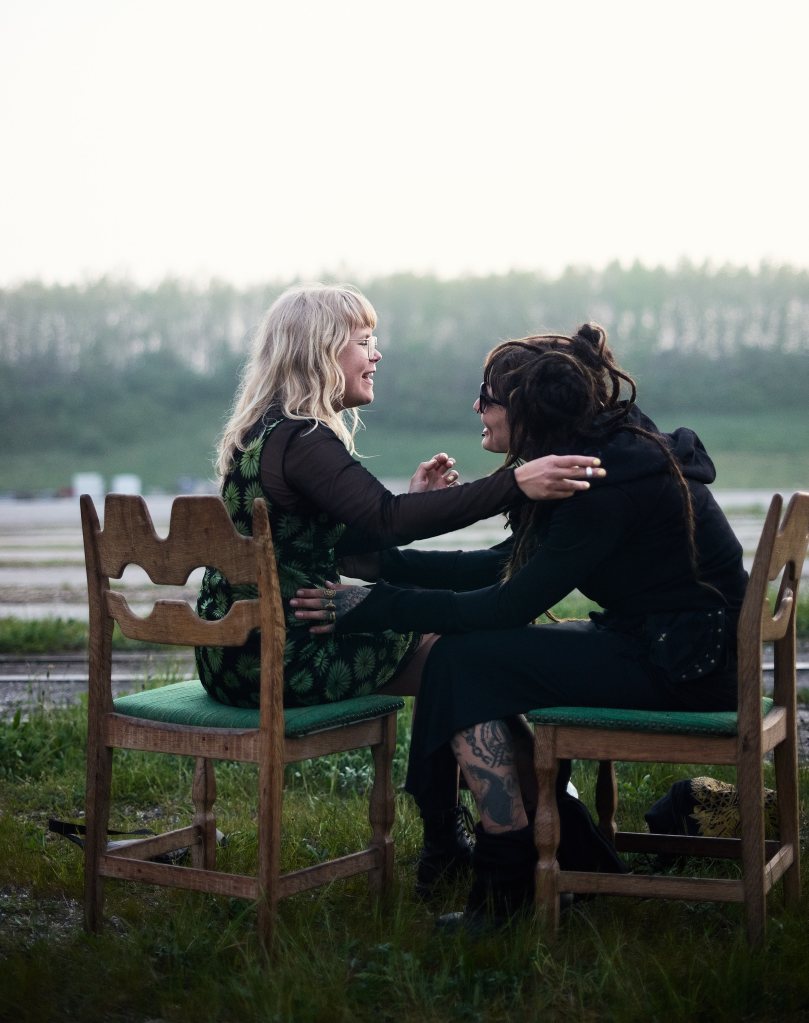
Photo: Morten Bentzon
‘Collective responsibility plays a huge factor in Fast Forward. We believe that together we can achieve a lot more. Due to the diversity in the crowd, and due to the majority of the people on the dancefloor that have implemented the safer spaces policy as the way to behave, makes it easier to educate on a collective scale as well. The crowd is mindful to what’s happening at the party, everybody keeps an eye out for one another and contribute to the good vibes.’
But Fast Forward goes further than pushing for inclusivity. In August 2019 the agency – in collaboration with club Ved Siden Af – financially supported the organization ‘Together We Push’ – a network and organization of volunteers dedicated to helping incarcerated refugee families and asylum seekers at a deportation camp in Copenhagen.

Photo: Agency runner of Fast Forward, Anders Marc by Morten Bentzon
Fast Forward explains the situation on their website. ‘In recent years governments all over Europe have lurched to the right, not least here in Denmark. Amongst a long list of new racist and xenophobic legislation – and as the neo-fascist Rasmus Paludan establishes his new party and is given government-funded protection for year-long hate-speech tours in areas with large Muslim populations – the Danish government is running several incarceration camps to hold rejected refugees. Living conditions in the camps are inhumane, children in them are being denied access to education, and according to humanitarian organisations many of the people held in them are showing signs of severe and increasing distress and mental illness.’
To help, Fast Forward’s finest DJs produced a compilation of tracks and organized a fundraiser in name of Together We Push. The proceeds of the party and the compilation all went to the organization, who used the money to buy food, necessities and to organize events for the children present at the local Sjælsmark camp.
‘A great number of people, that are within our community, are fed up with the Danish government and their right-turn and are tired of the politicians inability to act. That is why we wanted to support an initiative like Together We Push because they take immediate action, and are making a difference in the incarcerated people’s lives here and now.’
Anders feels that it’s important to speak up when you have the privilege to make an impact. ‘When you have an audience that has reached a certain size, you have the possibility to influence others in a positive way. In my opinion, I feel there’s some sort of obligation to then do it. I don’t want to enforce political values on our guests, but I would like to make a difference where it’s possible. Rave culture and social activism have been bound together since the beginning, and we would like to keep it that way.’

Photo: Schacke playing Fast Forward by Morten Bentzon
Political, inclusive, co-operative – Fast Forward seems to take upon the right stance on several matters but also when it comes to mental health. Lately it has been a hot topic within the DJ scene and the music industry. ‘As an agent, I’m very aware of how our artists are thriving,’ Anders explains.
‘It’s important to me that our artists gets enough downtime or studio time, as it can be hard to be wavering back and forth between gigs. Being on the road each weekend as an artist can wear you down, and it takes time to find mental capacity to be creative if you have used up all of your capacity during the weekend. If you push too hard, they might end up burning out in the process – and that doesn’t work if you want to be in this industry for many years. I think it’s really important to find a balance between your personal life and being constantly out there working the late hours and taking long-haul flights, long after the guests of the party already have returned back to their daily routine.’
Fast Forward has most certainly made an impact locally. The techno scene has expanded and the city has gained another club named Ved Siden Af (that started out as Et Andet Sted) – focussed on delivering high-quality line-ups and showcasing local talent. Furthermore, other rave collectives have emerged. Endurance – which focuses on creating high-quality raves with a friendly atmosphere in a hangar outside of Copenhagen.
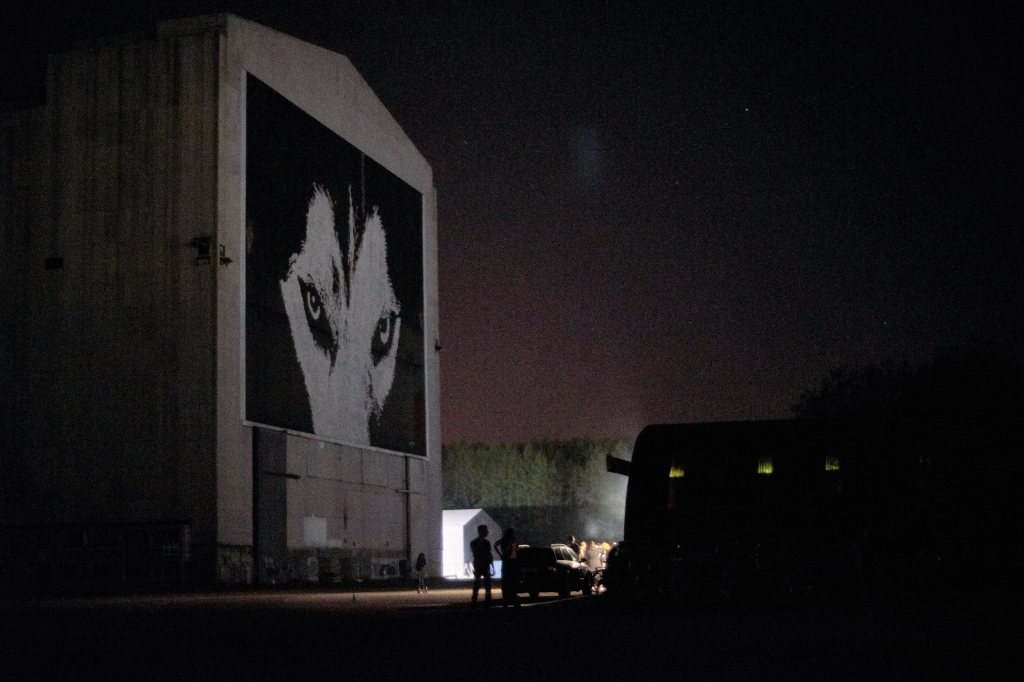
Photo: The Hangar by Morten Bentzon
But also ‘Club Mafia,’ a crew that pushes for inclusivity and hosts raves as well as Bedside productions – which can be compared to the pornceptual of Copenhagen (that organizes sex-positive techno parties with local DJs) – have made their move on Copenhagen’s electronic music scene.
The scene is now making its mark internationally due to the unique and fast, melodious sound the Copenhagen DJs are taking with them, playing the world’s biggest clubs. Courtesy’s label Kulør and Funeral Future’s label Euromantic have gained international attention, and collaborations between Fast Forward and like-minded crews support the expansion of the Copenhagen influence.
Endurance, Fast Forward and Ved Siden Af are currently setting the standard for the Danish techno scene and are expanding with collaborations out of town. However, due to rapid gentrification and restrictions there are still some threats to the city’s techno scene.

Photo: Endurance rave at the Hangar
Currently, Copenhagen only has two venues that are allowed to host parties later than eight in the morning. One is the hangar of Refshaleøen, located in the industrial area outside of the city – as well as KPH Volume, the warehouse the latest Fast Forward rave took place in. ‘Right now houses are being built at KPH Volume, so maybe parties here will be restricted too,’ Anders explains.
‘One of the biggest issues we have is complaints from neighbours,’ Benjamin adds. ‘As in cities like Berlin, we are facing a reality where people move in to areas of the city that has a tradition for life and music, and no tradition for quiet suburban living. Despite this fact, people move in and complain about the noise that occurs every second month, and unfortunately the local authorities often choose to listen to that one neighbour complaining, instead of accepting that 700 people are having a good time.’
Organizing something without a license to do so, is better left alone according to Anders. ‘In the past we hosted some outdoor summer parties at the bunker, there were no problems when the police came as long as we cleaned up after ourselves. The last five years, this has changed. The smallest hunch that something’s going on and the police hit hard. This is all due to gentrification, the right turn in the government, surveillance, there’s just a lot of pressure. It’s not only in Copenhagen, it’s all around the world. Look at Georgia, Germany and Poland for example – people here want freedom, people are uniting against oppression from the state towards rave and club culture.
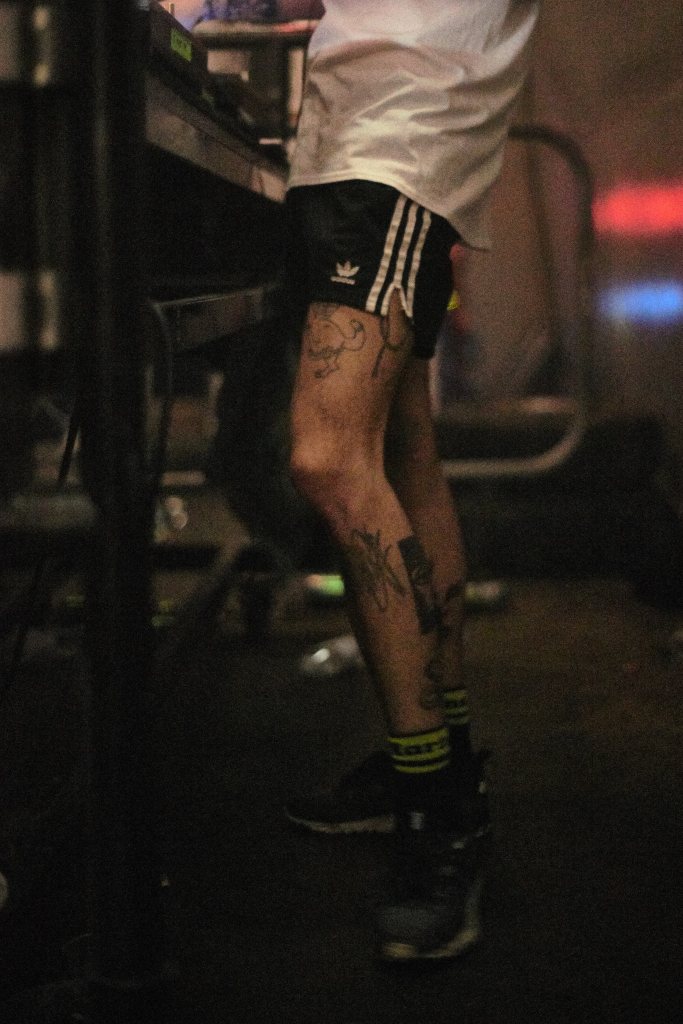
Photo: Schacke playing Endurance by Morten Bentzon
‘Most spaces in the city are government-funded and the rents to organize an event are insane,’ Freja mentions. If the city is unable to provide spaces that are not government-funded and thus cost a lot of money, it means there will be no more room which will most likely push the scene to the suburbs, further out of the city. ‘Young people will live there, the party will be there and it will most likely be subject to gentrification again,’ Anders says, ‘we would much rather prevent this from happening.’
Currently, the municipality is mapping the different crews, institutions and organizations involved in Copenhagen’s nightlife. Anders explains the developments, ‘We had a talk with different initiatives like Endurance, Ved Siden Af and the municipality about how we feel about certain subjects within nightlife. It’s important that we have these talks. This provides us with the chance to tell them that it’s hard to find funding or to be able to host events somewhere. So I’m curious what will come out of this. Even though we have a DIY mindset and normally wouldn’t ask the municipal for help, I think this is a great opportunity to build some bridges that will benefit both sides.’
Benjamin adds to this, ‘We are starting to face the fact that maybe we need to move our events to the suburbs of Copenhagen, finding industrial spots out there. But we are at the same organizing a resistance to this gentrification, and we are currently collaborating with Denmark’s biggest festival for Electronic Music, ‘Strøm,’ to have conversations with the political power in Copenhagen. To try to ensure more spaces for the non-commercial DIY scene. This said, it’s important to retain an anti-economic and independent relation to the political level, as this would kill the vibe of resistance and engagement.’

Photo: Endurance rave
‘There is some change taking place,’ Bjarke explains. ‘After political work being done by some of the crews here in Copenhagen, some politicians in the city want to take inclusivity of events into their decision process when deciding on giving out funding for events. It’s baby steps, but it’s something.’ ‘The danger however, is that economic support comes with a lot of regulations,’ Freja adds to this.
As for the future of Fast Forward, Anders says an optimistic outlook is key. ‘We are facing some challenges that will grow into a bigger issue in terms of venues, neighbours and regulations. But all problems have solutions, that’s why we take an active stand in what our beliefs are.’
When looking at international expansion, Anders wants to continue to grow the way they’re doing right now. ‘I want for the artists to continue to play in places that share the same values and to be part of more collaborations with like-minded crews.’

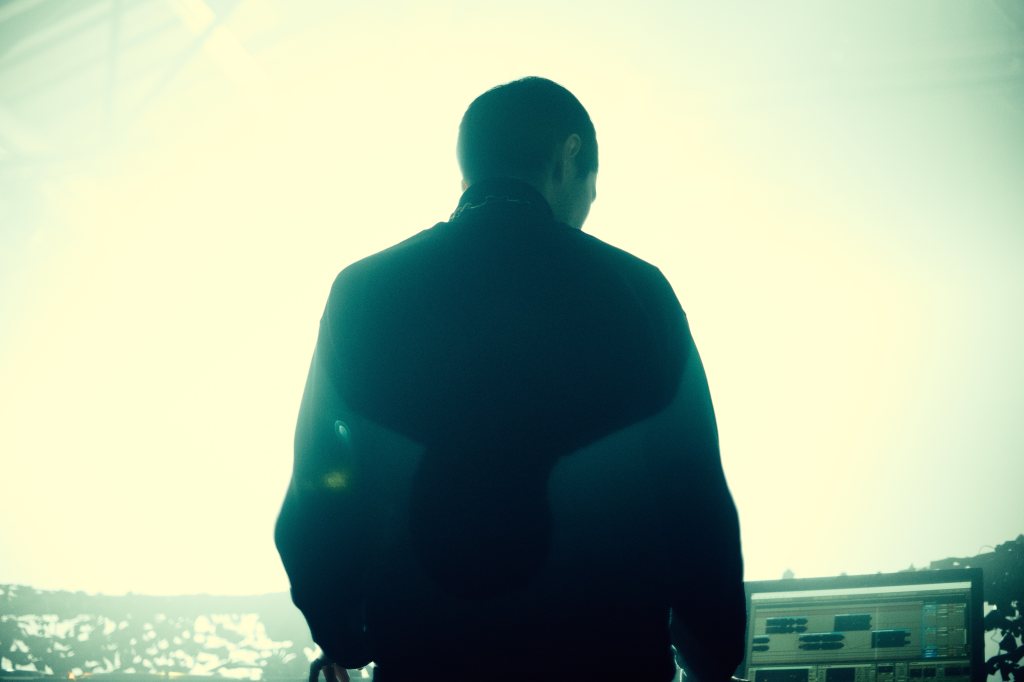
Leave a comment